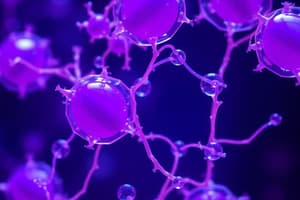Podcast
Questions and Answers
What is the function of the cell membrane?
What is the function of the cell membrane?
- Allows materials in and out of the cell (correct)
- Stores nutrients
- Produces energy
- Contains the DNA
What is cytoplasm?
What is cytoplasm?
The liquid that carries organelles, consisting of cytosol and organelles in the cytosol.
What is the role of a vacuole in a plant cell?
What is the role of a vacuole in a plant cell?
- Involved in intracellular digestion
- Site of protein synthesis
- Power center of the cell
- Holds nutrients, water, and waste (correct)
What is a mitochondrion?
What is a mitochondrion?
What is the function of the Golgi body?
What is the function of the Golgi body?
What do lysosomes do?
What do lysosomes do?
What does the nucleus contain?
What does the nucleus contain?
What is the primary function of the cell wall?
What is the primary function of the cell wall?
What role do ribosomes play in the cell?
What role do ribosomes play in the cell?
What is the function of the cytoskeleton?
What is the function of the cytoskeleton?
What is the main function of chloroplasts?
What is the main function of chloroplasts?
What are membrane proteins responsible for?
What are membrane proteins responsible for?
What is the function of the endoplasmic reticulum?
What is the function of the endoplasmic reticulum?
Flashcards are hidden until you start studying
Study Notes
Cell Membrane
- Composed of a double layer of phospholipids; hydrophilic heads and hydrophobic tails
- Regulates entry and exit of materials through membrane pores
Cytoplasm
- A gel-like fluid that includes cytosol and various organelles
- Provides a medium for biochemical reactions and helps in transportation within the cell
Vacuole
- Membrane-bound sac primarily for storage of nutrients, water, and waste
- Plant cells typically possess a single large vacuole, while animal cells have multiple smaller ones
- Plays a role in cell growth by increasing cell size
Mitochondrion
- Also known as the powerhouse of the cell
- Enclosed by double membranes, facilitating energy (ATP) production through cellular respiration
Golgi Body
- Receives, processes, packages, and distributes proteins and lipids from the endoplasmic reticulum
- Functions in the modification and transport of molecules to various parts of the cell
Lysosome
- Contains digestive enzymes for breaking down food particles, waste, and pathogens
- Critical for intracellular digestion and recycling of cellular components
Nucleus
- Houses the cell's genetic material (DNA) and regulates cell activities
- Considered the control center of the cell, influencing growth, metabolism, and reproduction
Cell Wall
- A rigid outer structure exclusive to plant cells that provides protection and shape
- Composed of polysaccharides like cellulose, contributing to structural integrity
Ribosomes
- Small organelles that facilitate protein synthesis by assembling amino acids
- Composed of RNA and proteins, existing as two subunits: large and small
Cytoskeleton
- An organized network of microtubules, actin filaments, and intermediate fibers
- Maintains cell shape and supports internal movement of organelles and muscle fiber contraction
Chloroplast
- Found only in plant cells, containing chlorophyll for photosynthesis
- Enclosed by a double outer membrane, critical for converting solar energy into food
Membrane Protein
- Embedded in the cell membrane, participating in cell communication and responses
- Includes marker proteins for immune identification, channel proteins for substance transport, and receptor proteins for signal reception
Endoplasmic Reticulum
- A labyrinthine structure that transports proteins and materials within the cell
- Divided into rough (with ribosomes) and smooth (without ribosomes) types, each serving distinct functions in metabolism and protein synthesis
Studying That Suits You
Use AI to generate personalized quizzes and flashcards to suit your learning preferences.




